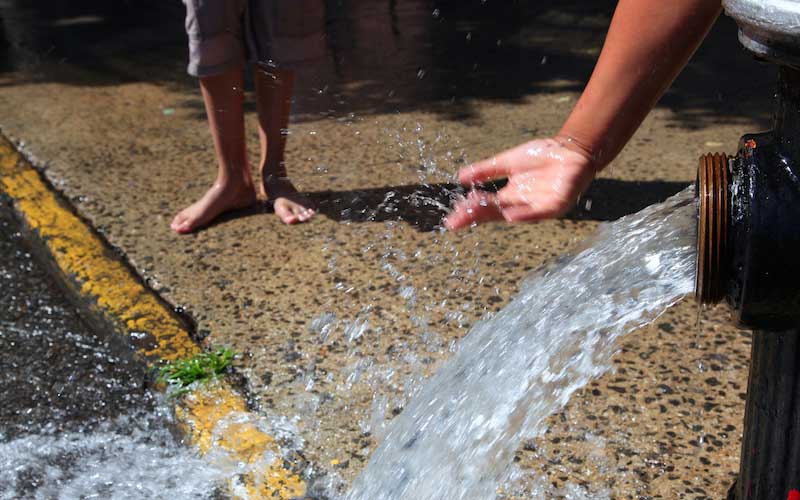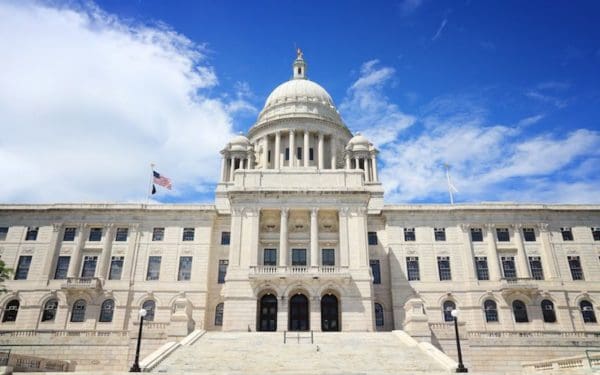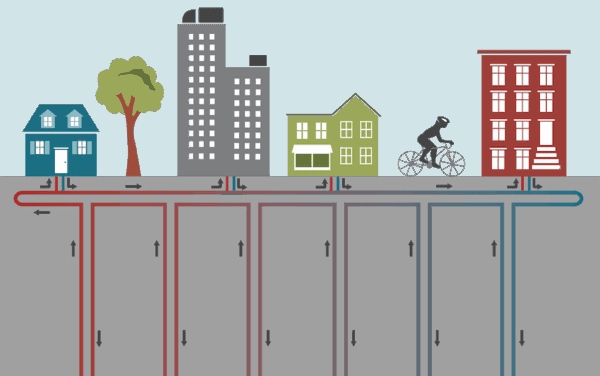
Extreme heat like we felt last month can have deadly consequences. Photo Credit: Shutterstock.
UPDATE: Temperatures across the Northeast have soared this summer — so much so that the National Weather Service issued a heat advisory for parts of Massachusetts and Connecticut last month. In fact, multiple states (including Connecticut and New Hampshire) broke their heat records in July.
It’s a deadly situation, particularly when paired with COVID-19. Heat waves hit disadvantaged communities hardest. And as emissions rise and climate change worsens, extreme heat becomes more common, and more people face these deadly conditions. We need to take action to prevent things from getting even worse — and to help those most affected.
Although it’s almost the end of August, New England is once again sweating through uncomfortably high temperatures. This past July was the hottest month in recorded history, and it followed the hottest June humans have ever seen. In fact, if you include 2019, the past five years have been the hottest five years on record. From New England to New Delhi, temperatures are rising fast, fueling deadly heat waves, severe droughts, and dangerous conflicts. We’re experiencing a climate crisis.
The data, compiled by the World Meteorological Organization, is bleak. Rising temperatures are causing more frequent and intense heat waves—like the ones that brought New England temperatures up to and above 100 degrees in both mid- and late July, or the one that broke temperature records across Europe around the same time. The heat is also noticeably raising sea levels. That same heat wave that hounded Europe then migrated north, melting more than 12.5 billion tons of water from the Greenland ice sheet on August 1 alone.
This is a huge problem. But we know the solution: slashing our climate-damaging emissions to zero by 2050. This means switching from dirty fossil fuels to clean local energy, trading out our gas guzzlers for electric cars, being smarter about our energy use overall—and being conscious that our solutions don’t further harm the most vulnerable among us who are already being hit first and worst by climate impacts.
To do this, we need strong climate laws on the books that require states to lower their emissions—and we need them now.
The Consequences of Inaction Are Deadly and Dangerous
Not only do rising temperatures mean deadly heat waves in New England and beyond, it also means more intense hurricanes, larger wildfires, collapsing fish populations, dangerous algae and weed blooms, and so much more. Not only are these disasters deadly—in fact, climate change represents the biggest threat to human health of this century—they’re also expensive. Climate impacts have already cost the U.S. more than $350 billion over the past 10 years, and are estimated to cost billions per year going forward.
No one is immune from these impacts. July’s extreme temperatures hit everywhere from Machias, Maine to New Canaan, Connecticut. And in a region where central air conditioning is a rarity, the poor air quality that comes along with extreme heat is not only uncomfortable but dangerous.
This is especially true for low-income and communities of color, where decades of housing discrimination have left neighborhoods with little green space and tree cover but with higher levels of air pollution than wealthier white communities. These neighborhoods are especially susceptible to the so-called heat island effect, meaning high temperatures are amplified as much as 50 degrees as sidewalks, streets, and buildings absorb the heat without enough trees and grass to combat the effect.
The extreme heat exacerbates asthma and other respiratory conditions, which are disproportionately higher in these communities, leading to more hospitalizations. The intense heat, day after day, can also lead to problems of dehydration, kidney failure, and heat stroke, as well as lack of sleep, irritability, and mental health issues. All told, the rising heat puts intense pressure on families and communities already overburdened with environmental injustices.
If we don’t take action to reverse the current trend of rising overall emissions, we’ll only see a greater concentration of these costly effects. On the other hand, if we do take action—immediately—we can change course.
We Need Political Will to Slash Emissions and Beat the Climate Crisis
Climate change is a problem of outdated systems and broken policies. We’re currently relying on an electric grid that is over 100 years old. It’s simply not designed for the number of people and electronic devices that now exist. We also remain too dependent on dirty fuels like fracked gas to heat and power our homes and businesses. Fortunately, we have solutions and replacements—if local and regional governments will step up and use them.
To start, we can switch from polluting fossil fuels to clean energy. Solar and wind, particularly offshore wind, can power thousands of homes and businesses without the need for leaky fracked gas pipelines. We can also make these same homes and businesses more energy efficient—so we all can have the same, or better, standards of living while using less energy. Next we can modernize our electricity grid, updating it for the 21st century and an economy built on clean energy rather than dirty fuel.
All of these solutions take political will. We need to update our state and federal policies to boost the build out of clean energy resources, standardize more efficient building codes, and incentivize businesses to get off gas. Most importantly, we need to pass strong climate laws that require states to reach zero climate-damaging emissions by 2050.
We Must Work Together to Demand Change
CLF has been forging lasting solutions to the region’s most pressing environmental challenges for more than 50 years. We helped Massachusetts put one of the nation’s first climate laws on the books, and then sued to ensure the state enforced it. We challenged coal plants around the region until the dirtiest among them stopped belching smoke. We advocated for the first offshore wind farm in the U.S., which now stands off the coast of Rhode Island and generates enough energy to power roughly 17,000 homes.
We couldn’t have done any of it without you. Together, we can—and should—demand progress from our leaders in state and local governments. Working together, we can push our elected officials to adopt the laws and policies we need to fight the climate crisis, and to build a better future for the generations of our families to come.



